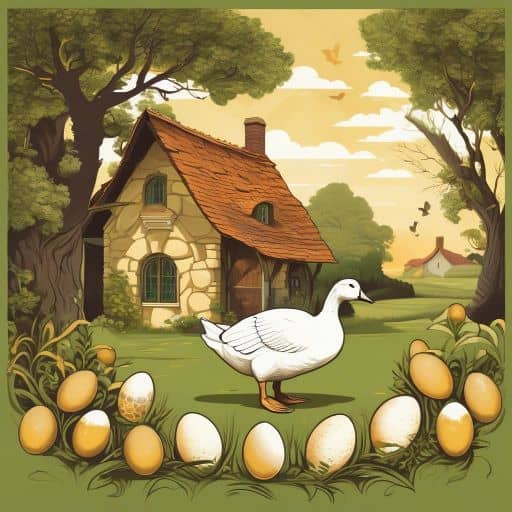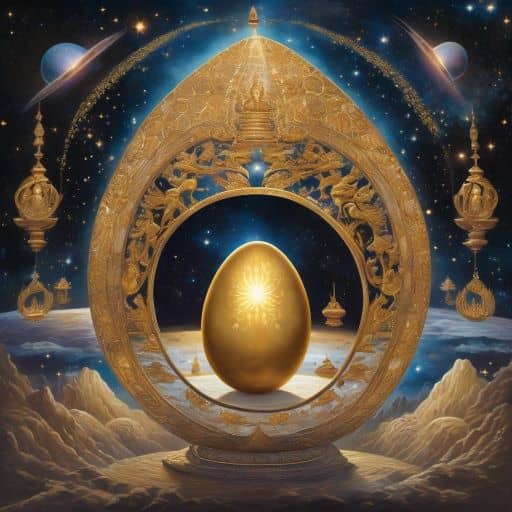Golden Egg: The Mythical Origins and Its Modern Significance
Unravel the legendary origins of the Golden Egg, explore its symbolism in mythology, literature, and finance, and understand its impact and significance today.
DIVINE
The Golden Egg: A Symbol of Myth, Wealth, and Opportunity
For centuries, the concept of the "Golden Egg" has captivated the imaginations of people across cultures. Dating back to ancient mythology and persisting into modern times, this symbol has morphed from mythical folklore into a metaphor for economic prosperity and potential. In this article, we will explore the origins and meanings of the Golden Egg, its appearances across various narratives, and how it has evolved to hold significant value in contemporary society.
A. Mythological Origins
The tale of the Golden Egg originates from several ancient cultures where it was often seen as a symbol of creation and abundance. In Greek mythology, the Cosmic Egg is the source of the universe's creation, laid by an eternal being. Similarly, in Hindu mythology, the universe begins with a cosmic golden egg known as "Hiranyagarbha."
B. The Golden Egg in Literature and Adaptations
The enduring motif of the Golden Egg has manifested across various forms of literature and adaptations, symbolizing wealth, potential, and often, the greed that can accompany them. From classic fables to modern storytelling, the Golden Egg continues to captivate as a versatile symbol of both opportunity and caution.
1. Aesop’s Fables and Their Influence
Aesop’s fable "The Goose That Laid the Golden Eggs" is perhaps the most iconic literary reference to the Golden Egg. In the tale, a farmer discovers his goose lays a golden egg every day. Instead of appreciating his fortune, the farmer succumbs to greed, eventually killing the goose in hopes of obtaining all the golden eggs at once. He finds nothing and loses his source of continuous wealth. This story offers a powerful moral about the dangers of greed and impatience, themes that have found resonance in many subsequent literary works and adaptations.
2. Children's Literature and Moral Lessons
In children's literature, the concept of the Golden Egg has been utilized to convey moral lessons about greed, gratitude, and the value of patience. Authors often reimagine the tale to address contemporary ethics or introduce it as part of larger narratives. These adaptations help to instil core values in young readers, using the vivid imagery of the Golden Egg to capture their attention and engagingly teach them virtues.
3. Modern Literature and Symbolism
In modern literature, authors have expanded the use of the Golden Egg as a sophisticated symbol, often representing the dualities of wealth and responsibility. It can serve as a metaphor for unforeseen wealth or the unexpected consequences of ambitions and desires. Contemporary novels might employ the Golden Egg as part of complex plotlines involving inheritance, discovery, or the burden of wealth, exploring deeper psychological and societal themes.
4. Film and Television Adaptations
The Golden Egg has also made its way into film and television, sometimes directly adapted from Aesop’s fable or used as a creative symbol within new stories. In animated films and series for children, the Golden Egg often appears as a mystical or magical object, embodying the wonder and whimsy that captivates young audiences while reinforcing the story's underlying moral message. For adult audiences, it might appear in dramas or mysteries as a trope for wealth and the ethical dilemmas it poses.
5. Artistic Interpretations
Beyond books and screen adaptations, the Golden Egg is also explored in other art forms, such as theatre, music, and visual arts. These adaptations often take creative liberties, expanding on the original legend or using the Golden Egg to draw parallels with current societal issues. In theatre, a production might use the Golden Egg to weave a narrative about human nature, while visual arts might depict it in paintings or sculptures as a symbol of life's potential and fragility.
The Golden Egg in literature and its numerous adaptations continues to be a potent symbol, rich with layers of meaning that transcend temporal boundaries. Whether conveying moral lessons in children’s tales or serving as a narrative device in contemporary literature, its significance remains universal. Through diverse interpretations and expressive mediums, the story of the Golden Egg endures, inviting each generation to reflect on its timeless themes of greed, patience, and the sustainable nurturing of wealth.
C. The Economic Metaphor
In the financial realm, "Golden Egg" has become an expression of an asset that consistently generates income or a lucrative investment opportunity. This notion is frequently employed in discussions about retirement savings, where a diversified portfolio might be considered as a "nest egg" that grows over time to ensure financial security.
D. Cultural Significance Today
Today, the symbolic meaning of the Golden Egg remains potent, representing potential, opportunity, and prosperity. It's not just a simple tale of wealth but also a reminder to cultivate and nurture one's "golden opportunities" wisely. In a world governed by fast-paced economic change, the principles derived from the Golden Egg story continue to resonate.
E. Conclusion
Through its transformation from myth to metaphor, the Golden Egg symbolizes enduring themes of creation, wealth, greed, and the careful nurturing of resources. Whether in ancient folklore, moral fables, or modern economic discourse, the lessons drawn from the Golden Egg encourage us to cherish and wisely manage our resources to cultivate lasting prosperity. As we navigate our personal and financial pathways, remembering the timeless wisdom of the Golden Egg can be both a guiding principle and a source of inspiration.





